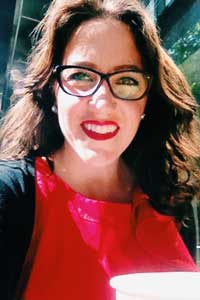by Megan Finnerty
 That’s a big promise. But that’s what my how-to workshop at the 2014 National Storytelling Conference promises: a way for you to make your community more awesome with little to no money and just the help of a few friends.
That’s a big promise. But that’s what my how-to workshop at the 2014 National Storytelling Conference promises: a way for you to make your community more awesome with little to no money and just the help of a few friends.
Across the country, live storytelling nights are proliferating in restaurants, bars and indie performance spaces. Call it the “This American Life” effect. Call it “The Moth” effect. Call it the storytelling podcast effect. Many of these high-profile nights have a few things in common: they’re supported by robust staffs, they’re in fairly large cities with big creative communities and they tend to work mostly with professional writers and performers, or, you know, ringers.
But the kinds of live storytelling nights that truly transform people, their ideas about themselves and their hopes for their city don’t require all that. They just need you.
The model Liz Warren, Marilyn Omifunke Torres and I use to run the Arizona Storytellers Project can be adopted by any storytelling professional in any town, with most any budget, and can be used to create the kind of community-revolutionizing nights that civic leaders, and storytelling lovers, dream about.
How? By focusing on story development more than story performance. Many of the biggest storytelling nights find and grow talent at random. They put calls out and the bold, the professional, the vain, the specially educated – essentially, those already so inclined to share – show up. This storytelling night model works in reverse. We highlight the skills of the professional storytelling mentor or educator to train all kinds of people to tell a compelling story, thus shifting the focus onto the craft and not just the charisma.
These nights train people to tell stories rather relying on the outspoken, clever and notable to step forward. Through that extensive pre-telling workshopping process, these nights inspire listeners in a unique way because they can all see themselves on that stage. They know the only barrier to their own night of telling is their willingness to reach out to the organizers.
Community storytelling nights that empower ALL members to share entertaining, universally appropriate, engaging stories are powerful because they allow privileged voices to be heard, they make spaces for the expression of the full range of human experiences, and because of their diversity, they more accurately reflect the communities they’re in.
And when people feel empowered to tell their stories, and others feel excited about listening, something in a community changes, even in one as sprawling and car-addicted and cut-off from civic life as Phoenix can be. People feel closer to each other. They feel more accepting of those unlike themselves. They feel more connected to their city and the people in it. They feel more ready to invest in it financially and emotionally
Or at least that’s what all the emails we get say.
These nights send a message to the whole community that everyone has a story worth telling, and that everyone CAN tell it. These nights also send a message to the community that everyone is worth listening to. Through workshopping, we can share powerful, deep, funny and risky stories with the kind of emotional safety for teller and listener that just can’t be achieved through hat-draws and public call-outs.
On a recent night of live storytelling, nine community members shared stories of life and death. Only one teller had previous training. All others managed to share super-risky stories in total confidence, keeping the audience entertained, emotionally moved, but also still within their comfort zones, because all of the tellers went through the workshop process.
So that night, we heard from a woman who gave birth to twins, but only one came home with her from the hospital. We heard from a man who cheated death countless times, cancer, plane troubles, an elevator fall. We heard from a woman who had a profound brain injury, and who is now functioning with about half her previous mental capacity. We heard from a man who survived heart surgery with his sense of humor in tact.
It was the kind of night that could’ve been traumatic to tell, and traumatic to listen to. But instead, as the 150 listeners filed out, I overheard one woman say to another how much the sharing of such important stories meant to her, adding: “This is more how people should live.”
It is how more people should live, telling stories from the heart, but doing so in a way that’s entertaining and emotionally safe. You can make this happen in your community.
About Megan
Megan Finnerty is the Page One reporter at the Arizona Republic and the founder and host of monthly nights of live storytelling called the Arizona Storytellers Project. She believes that with a time limit, some workshopping and a little empathy, everyone can learn to tell a story. That’s why she also works as a storytelling consultant to business and community leaders seeking to create meaningful connections through authentic communication. She enjoys cocktails, bright lipsticks and feminism.
Contact Megan
Website: meganmfinnerty.com
The Arizona Storytellers Project: storytellers.azcentral.com
Twitter: @MeganMFinnerty
